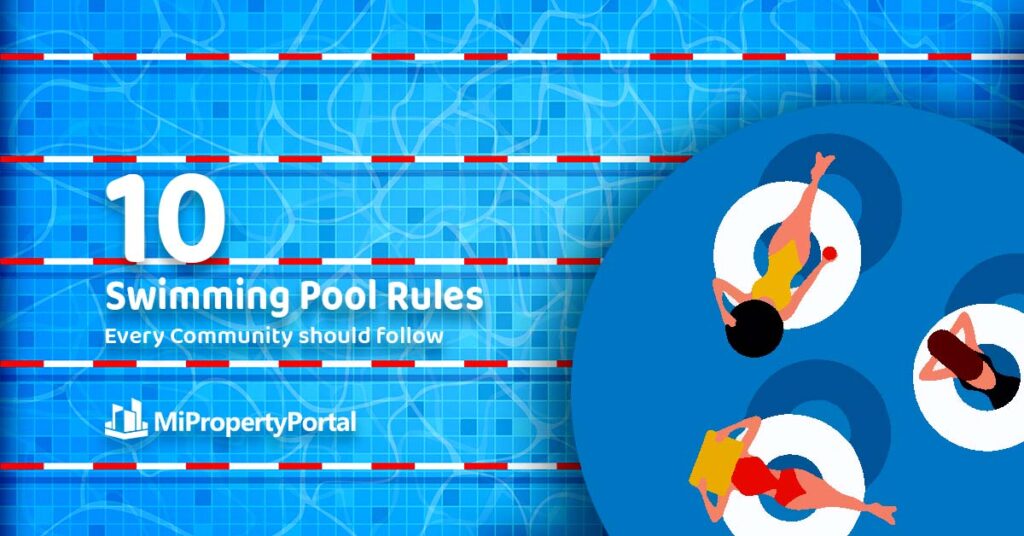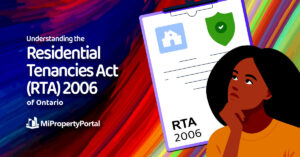10 Rules for Swimming Pools in Canada for Landlords and Tenants
Swimming pools are a fantastic way to work out and enjoy the outdoors with the community. However, safety should always come first.
In Canada, there are rules for pools that each community must abide by to ensure the well-being of the residents and guests who use residential swimming pools. Safety in swimming pool guidelines is most prioritized.
In this article, we will examine the essential guidelines tenants and landlords should follow.
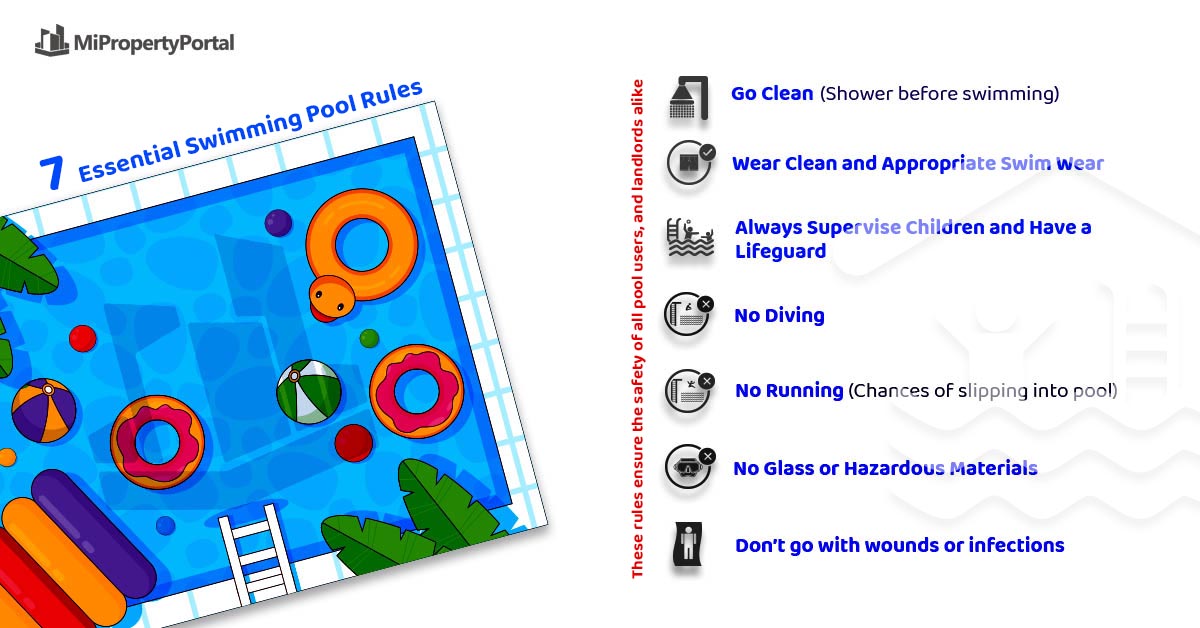
Guidelines for the Tenants and the Users
Below are the common pool rules to consider.
Go Clean
Take a shower before any other activity in the pool. Stay away from the water if you aren’t clean.
Wear Clean and Appropriate Swim Wear
Use appropriate and clean swimwear, including a swim cap, to protect your body and hair from harmful chemicals like chlorine in the pool. Avoid using swim gear that seems abandoned or lying around the pool area.
Always Supervise Children and Have a Life Guard
Never leave a child unattended near a swimming pool. Accidents can occur anytime, even if a person is a great swimmer. Ensure there is always an adult on site who can swim and is an expert in CPR.
Without the supervision of a lifeguard, trained instructor, or swimmer, never enter the water. They offer instructions so that people can have fun without endangering themselves. There is a reason why lifeguard regulations for swimming pools exist.
No Diving
Significant traumas, such as head or spinal cord injuries, can result from diving into a shallow pool. Allow diving only in intended areas and only if the water is at least 8 Feet 2.44 meters deep (8 feet).
No Running
Never run near a pool, as you might fall or slip. Running increases the risk of serious injuries. Adults and children should be cautious when entering, exiting, and walking around the pool area.
No Glass or Hazardous Materials
Keep all glassware away from the pool area and use plastic or metal containers only. Glass can easily break and cause injuries. Leaving broken glass or objects in or around the pool creates a hazard.
Don’t Go with Wounds or Infections
Infections and other waterborne illnesses spread from one to another in the swimming pool. Swimming is not advised if you are sick, have a cut, or have warts.
Guidelines for the Landlords
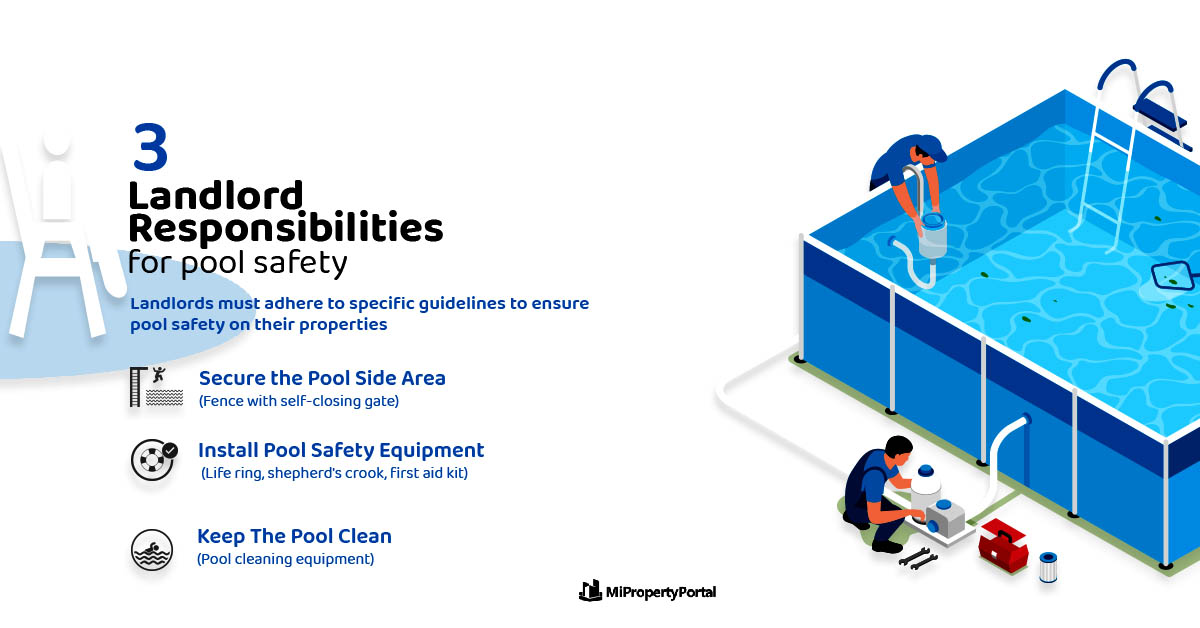
Secure the Pool Side Area
The rules for fence around pool are pretty much self-explanatory. Ensure that the gate has a self-closing and self-latching mechanism and that the pool area is securely fenced. Children should not be able to crawl through gaps or holes in the fence, which should be at least 4 Feet (1.2 meters high. The swimming pool fence rule is a must to pass the inspection.
Install Pool Safety Equipment
Include a life ring with a rope and a shepherd’s crook in every residential swimming pool as standard safety equipment. A first aid kit and a phone should also be available in the pool area.
Keep The Pool Clean
Regularly clean and maintain the pool to ensure the water is safe for swimming. Clean the pool at least once a week, and test the chemical levels regularly to ensure they are within safe limits.
Additional Tip: Provide Clear Instructions
Ensure the tenants know the rules and regulations and provide them with clear advice on using the pool safely. Consider giving tenants a copy of the rules for reference.
Click here for a detailed overview of the rules for pools and maintenance guidelines for residential and public pools in Canada.
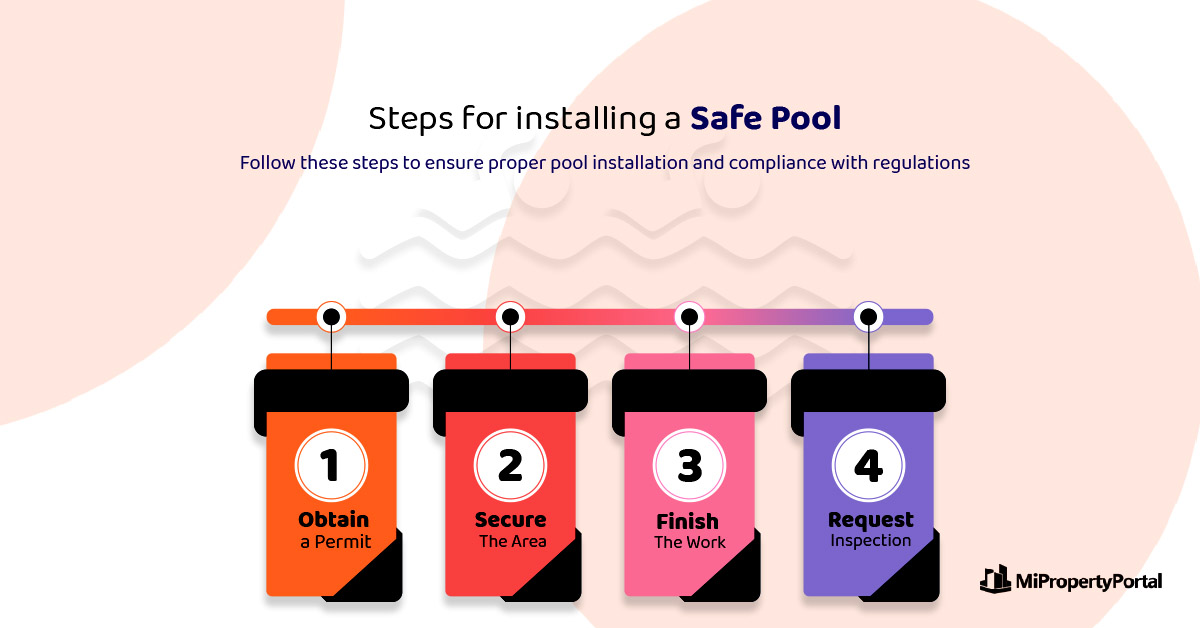
REQUIRED STEPS FOR POOL INSTALLATION
Follow the steps below to make sure your property is always safe and complies with the Provincial regulation:
1) Obtain a permit
2) Keep the area safe and secure while the swimming pool and enclosure are built and installed.
3) Finish the work following the permit guidelines.
4) Request for an inspection when all the work is finished.
The details and by-laws vary from province to province. Contact a professional with any inquiries, or click here to get an overview of British Columbia guidelines for pool operations.
Rules for Maintenance of the Swimming Pool
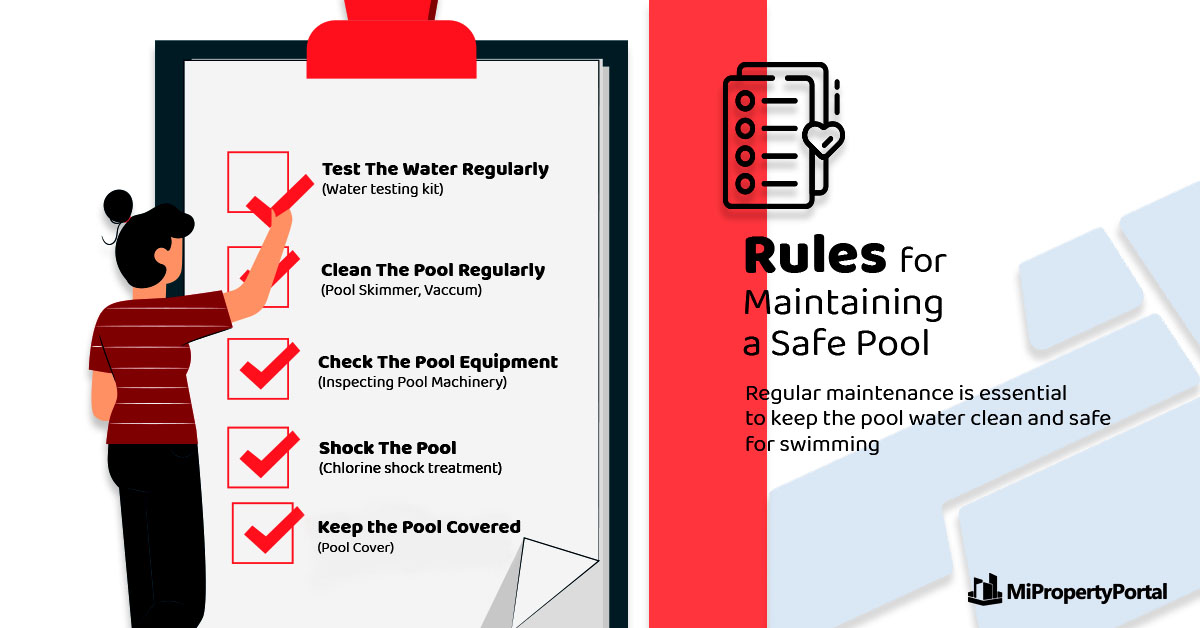
The water in a swimming pool must be kept clean, clear, and suitable for swimming. Proper pool maintenance can also increase the equipment’s lifespan. Here are some common swimming pool rules for managing a residential pool:
Test The Water Regularly
Test the chemical balance of the pool water per week at least. Pool water should have a pH between 7.2 and 7.8. Too high or too low of a pH level can harm pool equipment and irritate the skin and eyes.
Clean The Pool Regularly
Skim the water’s surface regularly to remove debris, and clean the pool’s bottom with a vacuum. Debris, including insects, leaves, and dirt, can quickly build up and cloud the water.
Check The Pool Equipment
The pool water may become contaminated and dangerous if any of the machinery breaks down. Regular inspections of the pool’s machinery, including the pump, filter, and skimmer basket, are necessary to guarantee proper operation.
Shock the Pool
Adding a significant amount of chlorine or another pool shock treatment to the water will destroy any bacteria and algae. Shock the pool once a week or required, but it is a must after significate usage or a rainstorm.
Keep the Pool Covered
Cover the pool when not in use. It will prevent debris from entering the water and reduce the chemicals required to maintain water quality.
Following these basic pool maintenance rules, you can keep your swimming pool clear, clean, and suitable for use. Additionally, paying attention to any special instructions given by the pool’s manufacturer or a reputable pool maintenance company is crucial.
Proper maintenance helps preserve the pool equipment’s durability and keep the pool looking its best.
Conclusion
It is vital to follow these guidelines for the safety of all tenants and users of residential swimming pools. Understand and follow the rules whether you are a landlord or a tenant. For detailed information, click here to learn the HOA Swimming Pool Rules.
So, enjoy your summer in the pool, but always prioritize safety first!
